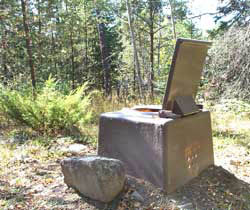USDA Forest Service Missoula Technology and Development Center Facilities Toolbox: Accessibility Tools
Does the Americans with Disabilities Act (ADA) apply to the Forest Service?
No, with one exception. Except for the section that applies to Federal wilderness areas, the programs and facilities of Federal agencies are NOT governed by the Americans with Disabilities Act (ADA) of 1990.
Why not? Federal agencies have been required to have accessible facilities since 1968, when the Architectural Barriers Act (ABA) became law. Federal agencies have been required to have accessible programs and activities since 1973, when Section 504 of the Rehabilitation Act was passed. The ADA, which became law in 1990, was modeled on those two laws. It applies to State and local government services and public accommodations.

This pit toilet in the Boundary Waters Canoe Area Wilderness is an accessible facility with minimum impact on the resource.
Forest: Superior
District: Ely
Region: 9
The section of the ADA that does govern Federal agencies is Title V Section 507 of the ADA, which pertains to Federal wilderness areas. This section reaffirms that the 1964 Wilderness Act doesn't prohibit the use of wheelchairs and also that agencies aren't required to change the character of wilderness areas in order to provide accessibility. It also defines the types of wheelchairs that can be used in federally designated wilderness. Facilities do not have to be constructed solely because a person with a disability might go to a wilderness area. However, if an agency decides to construct a facility, it must be accessible. For instance, in some areas of the Boundary Waters Canoe Area Wilderness, pit toilets have been provided for environmental reasons. The design of these toilets has been modified so that they are accessible.
Special-use permit holders must comply with the ABA and Section 504 because they are operating federally "assisted" programs. Permit holders are also governed by the ADA because they are public accommodations. See the Guidelines section of this toolbox for more information about laws, guidelines, and standards.

User Comments/Questions
Add Comment/Question